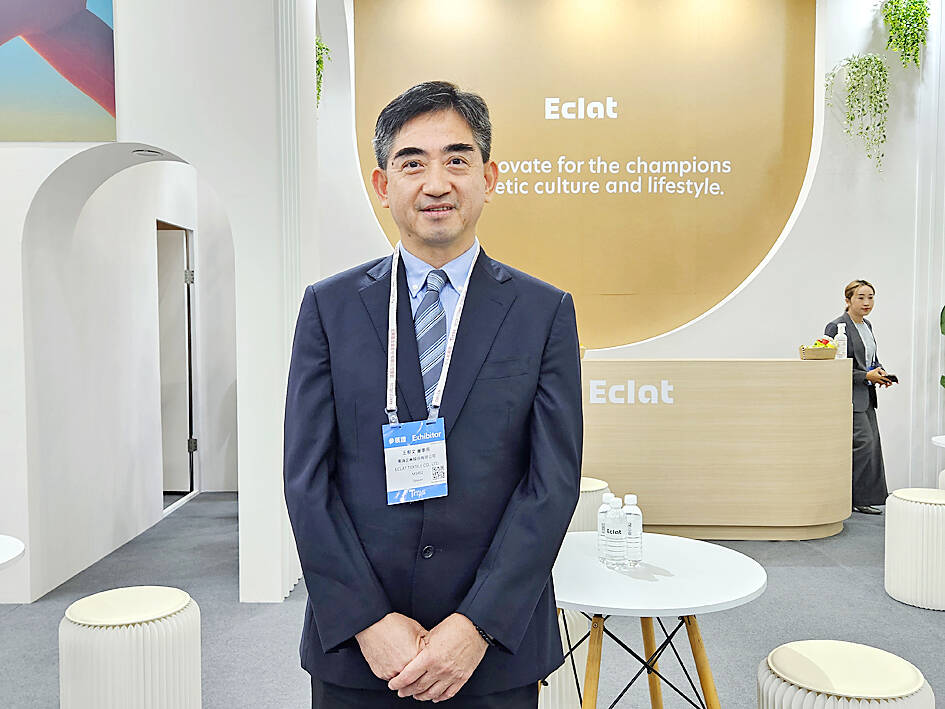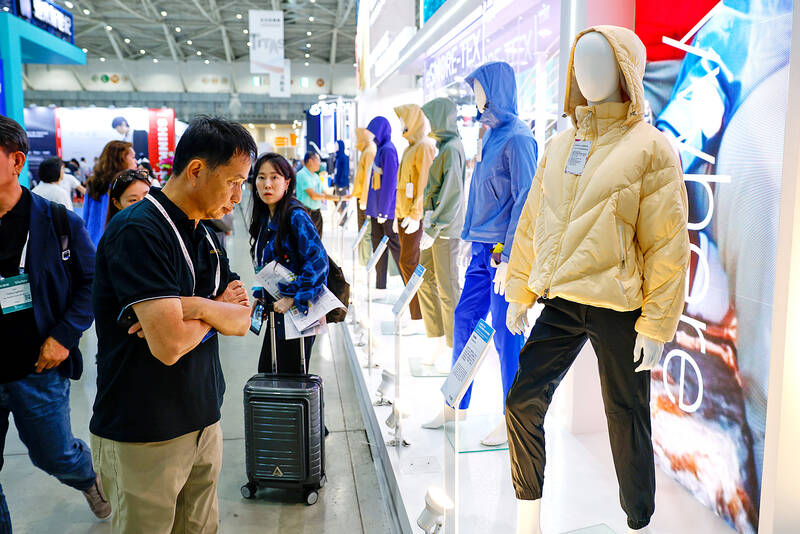Eclat Textile Co (儒鴻) yesterday said its operating performance was stable in the first three quarters of this year, but forecast a “very challenging” fourth quarter, citing the potential impacts of inflation in the US during the holiday season.
The garment and fabric supplier has a six-month order visibility and has secured 80 percent of forecast orders, but the remaining 20 percent would depend on holiday sales in the US this quarter, Eclat chairman Richard Wang (王樹文) said on the sidelines of the Taipei Innovative Textile Application Show.
The fourth quarter would be “challenging” mainly because of reports in the US last week showing prices had risen sharply, he said.

Photo: CNA
“The price of food and beverages has almost doubled, which is terrible,” cable TV station USTV quoted Wang as saying.
Rising inflationary pressures could reduce consumer purchasing power, and force them to postpone spending on nonessential items, he said.
If holiday sales fall short of expectations, it could affect the company’s first-quarter orders, he added.

Photo: Ritchie B. Tongo, EPA
“Under inflationary pressure, people might postpone purchases of cars and homes, but they still need to wear clothes,” meaning that overall demand for clothing would remain rigid, but not necessarily for high-priced brands, Wang said.
Such a scenario would affect sales momentum in retail channels and also impact the orders of downstream firms, he added.
The company’s order backlog remains at a reasonable level, but the challenge lies in whether it can ship the goods smoothly this quarter, he said.
Eclat, which counts global brands such as Nike Inc, Gap Inc, Target Corp, Lululemon Athletica Inc and Under Armour Inc among its top customers, last week reported that revenue for last month fell 3.25 percent from August to NT$3.24 billion (US$105.33 million).
However, it increased 1.59 percent from a year earlier, marking a record high for September.
Third-quarter revenue was NT$9.63 billion, down 0.87 percent from the previous quarter and 3.97 percent from a year earlier, the company said.
Cumulative revenue for the first three quarters totaled NT$28.73 billion, up 5.39 percent year-on-year, it said.
So far this year, the company’s monthly revenue has been more than NT$3 billion except for February, when it was NT$2.63 billion.
“This year has been a good year for Eclat, especially given the difficult macro environment,” Wang was quoted as saying. “The impact of tariffs on the company is limited.”
The textile exhibition opened yesterday at Taipei Nangang Exhibition Center’s Hall 1. Highlighting sustainability, functional applications and intelligent manufacturing, the three-day event runs through tomorrow.

Taiwan’s rapidly aging population is fueling a sharp increase in homes occupied solely by elderly people, a trend that is reshaping the nation’s housing market and social fabric, real-estate brokers said yesterday. About 850,000 residences were occupied by elderly people in the first quarter, including 655,000 that housed only one resident, the Ministry of the Interior said. The figures have nearly doubled from a decade earlier, Great Home Realty Co (大家房屋) said, as people aged 65 and older now make up 20.8 percent of the population. “The so-called silver tsunami represents more than just a demographic shift — it could fundamentally redefine the

The US government on Wednesday sanctioned more than two dozen companies in China, Turkey and the United Arab Emirates, including offshoots of a US chip firm, accusing the businesses of providing illicit support to Iran’s military or proxies. The US Department of Commerce included two subsidiaries of US-based chip distributor Arrow Electronics Inc (艾睿電子) on its so-called entity list published on the federal register for facilitating purchases by Iran’s proxies of US tech. Arrow spokesman John Hourigan said that the subsidiaries have been operating in full compliance with US export control regulations and his company is discussing with the US Bureau of

Businesses across the global semiconductor supply chain are bracing themselves for disruptions from an escalating trade war, after China imposed curbs on rare earth mineral exports and the US responded with additional tariffs and restrictions on software sales to the Asian nation. China’s restrictions, the most targeted move yet to limit supplies of rare earth materials, represent the first major attempt by Beijing to exercise long-arm jurisdiction over foreign companies to target the semiconductor industry, threatening to stall the chips powering the artificial intelligence (AI) boom. They prompted US President Donald Trump on Friday to announce that he would impose an additional

Pegatron Corp (和碩), a key assembler of Apple Inc’s iPhones, on Thursday reported a 12.3 percent year-on-year decline in revenue for last quarter to NT$257.86 billion (US$8.44 billion), but it expects revenue to improve in the second half on traditional holiday demand. The fourth quarter is usually the peak season for its communications products, a company official said on condition of anonymity. As Apple released its new iPhone 17 series early last month, sales in the communications segment rose sequentially last month, the official said. Shipments to Apple have been stable and in line with earlier expectations, they said. Pegatron shipped 2.4 million notebook